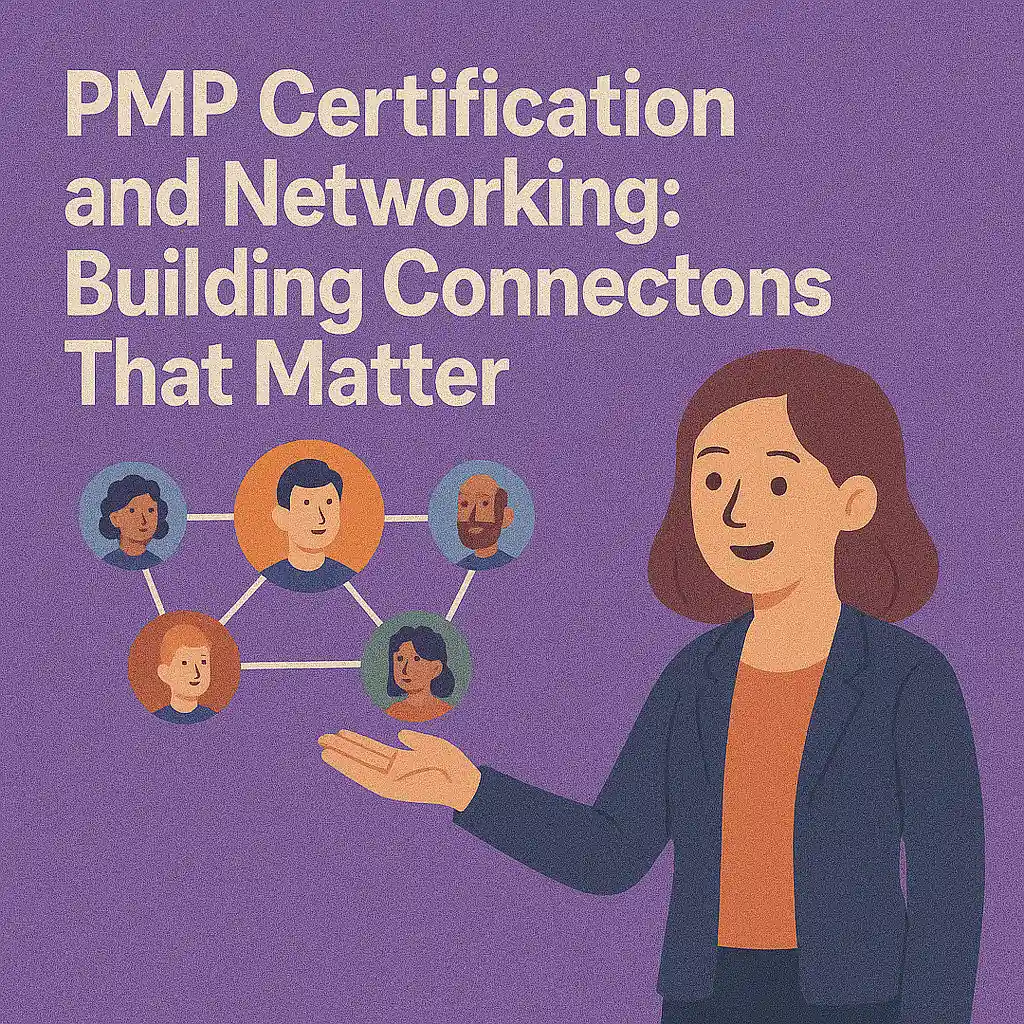Introduction
The Project Management Professional (PMP) certification has emerged as a hallmark of excellence. This globally recognized credential, awarded by the Project Management Institute (PMI), signifies that an individual has met rigorous standards and possesses a deep understanding of project management principles. As professionals navigate their careers, the value of PMP certification extends beyond just skill enhancement; it serves as a gateway to a vast network of industry connections.
Networking plays a crucial role in project management, where collaboration and communication are key to success. Building relationships with other professionals can lead to new opportunities, insights, and partnerships that are essential for career advancement. The PMP certification not only equips individuals with core project management skills but also positions them within a community of over one million certified professionals worldwide. This community fosters an environment where knowledge sharing and collaboration thrive, making it easier for certified project managers to connect with peers, mentors, and industry leaders.
In essence, obtaining a PMP certification is not merely about gaining a credential; it is about unlocking a treasure trove of networking opportunities that can significantly impact one’s career trajectory. By enhancing skills and expanding professional connections, PMP certification proves to be a valuable investment for those looking to elevate their standing in the project management field.
Understanding PMP Certification
PMP (Project Management Professional) certification is a globally recognized credential offered by the Project Management Institute (PMI). It signifies that an individual possesses the necessary skills, knowledge, and experience to lead and direct projects effectively. The certification is highly regarded in the field of project management and is often seen as a benchmark for professional excellence. Here are some key points to consider regarding PMP certification:
- Definition and Significance: PMP certification is an indication of a project manager’s ability to manage projects successfully. It is recognized worldwide and is often a requirement for project management positions, making it a valuable asset for career advancement and professional credibility [2][3].
- Requirements and Process: To qualify for the PMP certification, candidates must meet specific criteria set by PMI. This includes having a certain amount of project management experience and education. Typically, candidates need to have at least 3 years of project management experience, along with 35 hours of project management education. The process involves submitting an application, passing a rigorous exam, and adhering to PMI’s code of ethics [4][10].
- Skills and Knowledge Gained: Obtaining PMP certification equips professionals with a comprehensive understanding of project management principles and practices. Candidates learn about various project management methodologies, tools, and techniques, which enhance their ability to plan, execute, and close projects effectively. Additionally, PMP certification fosters skills in leadership, communication, risk management, and stakeholder engagement, all of which are crucial for successful project delivery [6][8].
The Value of Networking in Project Management
Networking is not just a supplementary activity; it is a vital component that can significantly influence career advancement and project success. Obtaining a Project Management Professional (PMP) certification can be a game-changer in this regard, as it opens doors to a vast network of professionals and opportunities.
Collaborative Opportunities Through Networking
One of the primary benefits of networking is the potential for collaborative opportunities. When project managers connect with others in their field, they can share insights, resources, and best practices that enhance project outcomes. Networking allows professionals to:
- Exchange Knowledge: Engaging with peers can lead to the sharing of innovative ideas and solutions that can be applied to current projects.
- Find Mentorship: Networking can help individuals find mentors who can provide guidance and support, which is invaluable for career growth.
- Collaborate on Projects: Connections made through networking can lead to partnerships on projects, allowing for a pooling of resources and expertise that can drive success.
The Benefits of a Diverse Professional Network
Having a diverse professional network is particularly beneficial in project management. A varied network can provide different perspectives and insights, which can be crucial in navigating complex projects. Key advantages include:
- Broader Perspectives: A diverse network brings together individuals from various backgrounds and industries, fostering creativity and innovation in problem-solving.
- Access to Opportunities: Many organizations specifically seek out PMP-certified professionals when filling project management roles, making it essential to be part of a network that includes these decision-makers [2][8].
- Increased Visibility: Being part of a professional community enhances visibility within the industry, making it easier to be recognized for skills and achievements.
Statistics and Case Studies Illustrating Successful Networking Outcomes
The impact of networking on career advancement is well-documented. For instance, statistics show that PMP certification can lead to higher salary potential and better job opportunities, with many organizations prioritizing candidates with this credential [1][3].
Moreover, a study conducted by the Project Management Institute (PMI) revealed that professionals who actively networked reported a 20% increase in job opportunities compared to those who did not engage in networking activities [5].
Additionally, case studies highlight the success stories of project managers who leveraged their PMP certification to build connections that led to significant career advancements. For example, a project manager who attended PMI networking events was able to secure a leadership role in a major project due to the relationships formed during these gatherings [6][7].
How PMP Certification Facilitates Networking
PMP (Project Management Professional) certification is not just a credential that signifies expertise in project management; it also serves as a powerful catalyst for networking opportunities. Here’s how obtaining a PMP certification can significantly enhance your professional connections:
- Access to a Global Community: Earning a PMP certification connects professionals to a vast network of certified project managers worldwide. This global community provides a platform for sharing knowledge, experiences, and best practices, which can be invaluable for career growth and development. As a PMP-certified individual, you gain access to a network of peers who can offer support, mentorship, and collaboration opportunities [1][2].
- Role of PMI and Local Chapters: The Project Management Institute (PMI) plays a crucial role in facilitating networking for PMP holders. PMI not only provides resources and support for project management professionals but also organizes local chapters that foster community engagement. These chapters often host events, workshops, and meetings that allow members to connect with one another, share insights, and build relationships within the industry [5][6]. Being part of a local chapter can enhance your visibility and credibility in the field, making it easier to forge meaningful connections.
- Networking Events, Seminars, and Webinars: PMP certification holders have access to a variety of networking events, seminars, and webinars organized by PMI and other professional organizations. These events are designed to bring together project management professionals from diverse backgrounds, providing opportunities to learn from industry leaders and engage in discussions on current trends and challenges in project management. Participating in these events not only helps in expanding your professional network but also keeps you updated on the latest developments in the field [4][7][8].
Real-Life Networking Success Stories
The Project Management Professional (PMP) certification is not just a credential that enhances your project management skills; it also serves as a powerful tool for networking. Many professionals have leveraged their PMP certification to build valuable connections that have significantly impacted their careers. Here are some inspiring testimonials and examples that illustrate how PMP certification can open doors to networking opportunities.
- John’s Journey: After several years in project management, John decided to pursue his PMP certification to advance his career. Through the certification process, he attended various workshops and seminars where he met industry leaders and fellow project managers. One connection led to a collaborative project that not only expanded his professional network but also resulted in a job offer from a leading firm in his field. John’s story exemplifies how the PMP certification can facilitate meaningful connections that lead to career advancement [2][8].
- Sarah’s Transformation: Sarah, a project manager in the healthcare sector, found that obtaining her PMP certification allowed her to engage with a broader community of professionals. She attended a PMP networking event where she met a mentor who guided her through a significant career transition. This relationship not only provided her with insights into industry trends but also led to a partnership on a high-profile project that enhanced her visibility in the field. Sarah’s experience highlights the importance of networking in leveraging certification for career growth [3][4].
- Rajeev’s Experience: With over 16 years in IT, Rajeev pursued his PMP certification to solidify his expertise. During his preparation, he connected with other candidates and industry veterans through study groups and online forums. These interactions led to collaborative opportunities, including a joint venture with a colleague that resulted in a successful project launch. Rajeev’s journey illustrates how networking through PMP certification can lead to innovative collaborations and professional growth [5][10].
- Diverse Perspectives: The benefits of networking through PMP certification extend across various industries. For instance, professionals in construction, IT, and healthcare have all reported enhanced networking opportunities post-certification. They have shared experiences of meeting potential employers, forming strategic partnerships, and gaining insights from seasoned professionals. This diversity showcases the broad applicability of the PMP certification and its role in fostering connections that matter [1][12].
John’s Journey: After several years in project management, John decided to pursue his PMP certification to advance his career. Through the certification process, he attended various workshops and seminars where he met industry leaders and fellow project managers. One connection led to a collaborative project that not only expanded his professional network but also resulted in a job offer from a leading firm in his field. John’s story exemplifies how the PMP certification can facilitate meaningful connections that lead to career advancement [2][8].
Tips for Effective Networking as a PMP Certified Professional
Obtaining a Project Management Professional (PMP) certification is not just about enhancing your project management skills; it also serves as a powerful catalyst for building valuable professional connections. Networking is essential for career advancement, and here are some actionable strategies to help you maximize your networking efforts as a PMP certified professional.
1. Initiating Conversations at Industry Events
- Be Prepared: Before attending any event, research the attendees and speakers. Familiarize yourself with their work and interests, which can provide excellent conversation starters.
- Ask Open-Ended Questions: Engage others by asking questions that require more than a yes or no answer. This encourages deeper discussions and shows genuine interest in their experiences and insights [1].
- Share Your Experiences: When conversing, share your own project management experiences and insights. This not only showcases your expertise but also invites others to share theirs, fostering a two-way dialogue [2].
2. Leveraging Online Networking Platforms
- Utilize LinkedIn: As a PMP, LinkedIn is an invaluable tool for networking. Regularly update your profile to reflect your latest achievements and certifications. Engage with content relevant to project management and connect with other professionals in your field [3].
- Join Relevant Groups: Participate in LinkedIn groups focused on project management. These groups provide a platform for discussions, sharing resources, and connecting with like-minded professionals [4].
- Follow Industry Leaders: Connect with and follow industry leaders and organizations on LinkedIn. Engaging with their posts can increase your visibility and open doors for further connections [5].
3. Joining PMI Chapters and Attending Conferences
- Become a Member of PMI Chapters: Local chapters of the Project Management Institute (PMI) offer a wealth of networking opportunities. Attend meetings and events to meet fellow PMPs and industry professionals [6].
- Participate in Conferences and Workshops: Industry conferences are excellent venues for networking. Attend workshops and seminars to learn from experts while also meeting peers who share your interests [7].
- Engage in Discussion Groups: Actively participate in discussion groups, both online and offline. These forums allow you to share knowledge, ask questions, and connect with others who are passionate about project management [8].
By implementing these strategies, PMP certified professionals can significantly enhance their networking efforts, leading to valuable connections that can propel their careers forward. Networking is not just about collecting contacts; it’s about building relationships that can lead to new opportunities and collaborations in the project management field.
Conclusion
The value of networking cannot be overstated, and obtaining a PMP (Project Management Professional) certification is a strategic move that significantly enhances your networking opportunities. Here’s a recap of how PMP certification can open doors to valuable connections:
- Global Recognition: The PMP certification is recognized and respected worldwide, which allows certified professionals to connect with a diverse network of project managers and industry leaders across various sectors. This global acknowledgment fosters relationships that can lead to collaborative opportunities and knowledge sharing [10][15].
- Access to PMI’s Network: By becoming PMP-certified, you gain access to the Project Management Institute’s (PMI) extensive network, which includes local chapters, events, and online forums. This network provides a platform for professionals to engage with like-minded individuals, share best practices, and learn from each other’s experiences [14][10].
- Career Advancement: Networking through PMP certification can lead to career advancement opportunities. Many employers prefer or require PMP-certified professionals, making it easier to secure job opportunities and promotions. The connections you build can also provide insights into job openings and industry trends that may not be publicly advertised [4][11].
- Enhanced Professional Development: Engaging with a network of certified professionals allows for continuous learning and professional growth. Networking events and workshops often feature industry experts who share valuable insights and strategies that can enhance your project management skills [3][4].
In conclusion, investing in your professional development through PMP certification is not just about gaining a credential; it’s about building a robust network that can propel your career forward. The connections you make can lead to mentorship opportunities, collaborations, and even job offers that might otherwise be out of reach.
Find out more about Shaun Stoltz https://www.shaunstoltz.com/about/.
This post was written by an AI and reviewed/edited by a human.



